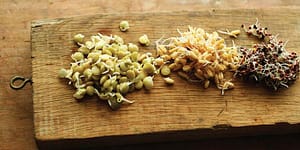The Terrifying Diagnosis: Where Do We Go from Here?

Cancer is a terrifying diagnosis for many people and their loved ones. While the medical community has made immense progress in treating it, there are still a lot of uncertainties.
The biggest being that even after years of research, there is still no cure. Each question we answer only leads to a new one, adding to cancer’s complex nature.
The following is an excerpt from Tripping Over the Truth by Travis Christofferson. It has been adapted for the web.
Siddhartha Mukherjee’s The Emperor of All Maladies is a rich and exhaustive narrative, a true biography of cancer. The vast account begins with a question:
Is the end of cancer conceivable? Is it possible to eradicate this disease from our bodies and society forever?
The question now is more relevant than ever. Cancer is on the march and will soon pass heart disease as our number one killer.
As Mukherjee explains, “Indeed as the fraction of those affected by cancer creeps inexorably in some nations from one in four to one in three to one in two, cancer will, indeed, be the new normal—an inevitability.”
In 2014 the World Health Organization issued a report warning of an upcoming “tidal wave” of cancer, declaring that fourteen million people are diagnosed with cancer each year. That number is predicted to increase to nineteen million by 2025, twenty-two million by 2030, and twenty-four million by 2035.
Can cancer be defeated? Mukherjee’s conclusion is grim, casting the disease as something inexorably woven into the fabric of our existence.
Cancer is stitched into our own genomes. . . . We can rid ourselves of cancer, then, only as much as we can rid ourselves of the process in our physiology that depends on growth—aging, regeneration, healing, reproduction. . . . It is unclear whether an intervention that discriminates between malignant and normal growth is even possible.
A victory over cancer, he says, “would be a victory over our own inevitability—a victory over our own genomes.”
Like the majority of cancer researchers today, Mukherjee believes that cancer is purely genetic—born out of random mutations that will inevitably occur within our DNA, so intertwined with the thread of our life that it is impossible to untangle—an interpretation that leads to a cul-de-sac of untreatable inevitability.
But his conclusion is based on an interpretation of the science describing the nature of cancer. Cancer is only cast as an inevitability if, in its heart of hearts, it is caused and driven by mutations to DNA.
The answer to this question depends on the nature of the beast—a scientific detective story that is still unfolding.
It is a strange time for the basic biology of cancer. The Cancer Genome Atlas (TCGA) was supposed to be our final destination—all roads led to it.
At no time in history have we had such exquisite tools with which to view cancer. In the past scientists tried to piece together the complex murder mystery using a crackling, old radio that cut out for extended periods only to briefly turn on and provide glimpses of the story.
Today, at least with respect to genetic mutations, scientists view the story in high definition from beginning to end.
And it has shown cancer to be a disease of biblical complexity—causing many to pause—forcing cancer’s preeminent researcher, Bert Vogelstein, to fill the void of understanding with something not yet discovered, an ephemeral “dark matter,” an elegant way of saying “we don’t know.”
At the same time, emerging evidence cast the metabolic theory under a new light, pushing the limits of its viability far past Otto Warburg’s single observation.
I use James Watson’s story as a common thread through this book for many reasons—partly because he discovered DNA, the molecule thought to be the center of cancer, and partly because of his iconic status in the cancer research community, but mostly because of his thinking on the direction that cancer research should go: away from genetics and toward metabolism and ROS therapies.
I wish I had been able to interview him or at least thank him, but my attempts went unanswered. I don’t know what he would have said about 3-bromopyruvate (3BP) and if his interpretation of events is different from Peter Pedersen’s or Young Ko’s.
But it is clear from his writings that he recognizes the tremendous potential of the molecule.
Most scientists are convinced that cancer was established as a genetic disease decades ago. This view appears now to have been one-dimensional, and it ignores evidence that looks at cancer in two or three intertwined dimensions.
Some scientists are coming around to the idea that cancer might be a metabolic disease—not because anyone convinced them to think differently, but because the science led them there. The position that cancer is caused solely by mutations to key genes is becoming harder to maintain.
The inconsistencies are too numerous and pronounced. No researcher today can point to any single mutation or any combination of mutations and say with confidence that it alone is the cause of cancer. Nor can researchers point to a series of cellular systems rendered dysfunctional by mutations and make the same claim with confidence.
Cancer is perceived as a predictable manifestation of a universe that tends toward chaos—one that favors disorder over order. It is seen as accidental.
Although the origin of cancer may be the result of chaos, the disease itself is anything but.
It takes a remarkable amount of coordination to do what cancer does, to go through the elaborate functionality of the cell cycle flawlessly and repeatedly.
To transition to energy creation by fermentation means that the cell must drastically alter its enzymatic profile in an orderly manner. To direct the growth of new vessels to feed the growing mass takes an exquisitely complex series of operations.
Cancer is a disease of order, and at every step of the way, it is directed and coordinated from somewhere.
There is a poignant difference in feeling from scientists who espouse the somatic mutation theory (SMT) compared to those who champion the metabolic theory. The genetic camp feels almost defeated, like a dead end had been reached.
There is an undeniable aura of loss and “where do we go from here?” In sharp contrast, the scientists who back the metabolic theory of cancer—Thomas Seyfried, Pedersen, Dominic D’Agostino, Ko, and others—exude excitement. Their labs bubble like Silicon Valley start-ups.
They feel that they are on to something big. When I ask most scientists about the inconsistencies embedded in the genetic theory, I’d usually get a quizzical look followed by the statement, “Well, cancer is more complex than we thought.”
Most still do not question the SMT and are largely unaware of the profound inconsistencies that plague the theory.
When Harold Varmus and Michael Bishop discovered that the Rous sarcoma virus (RSV) contained a slightly distorted version of one of our own genes, it seemed like a trick.
Could a virus really capture a single gene and reinsert its malevolent doppelganger directly into DNA, resulting in a disease characterized by complexity?
Simply deleting a few amino acids from a single kinase protein results in a disease that can grow new blood vessels to supply its needs and undergo the remarkable biochemical shift to glucose metabolism? The concept seems unlikely.
Peyton Rous never believed in the SMT of cancer and vehemently argued against it. But Varmus and Bishop made Rous appear the fool when they showed that the virus that bore his name had committed treason by incontrovertibly confirming the SMT.
“Nature has a sardonic sense of humor,” Rous said of cancer’s deck of trick cards. Was he wrong? When it was proven that the Rous virus concentrated its pathology within the mitochondria, a new question emerged.
What was transforming the cell: the single, altered protein product of the Rous viral src gene or a distress call from badly damaged mitochondria to a plethora of signaling hubs, activating a coordinated response and manifesting the complex operations of the cancer cell?
One was a single mutation, one of an almost infinite number of mutations that could manifest in the same disease. The other, a process active in every cancer cell regardless of tissue type, as PET scans show.
If time proves that the metabolism of cancer is more important than previously thought—maybe the precipitating or “big bang” event we have been desperately chasing—then, as Rous suggested, nature will have deceived us again.
Whether God, Mother Nature, evolution, or whatever shaped the world we live in, we must concede that in the realm of disease, cancer is her masterpiece.
It is the Bobby Fischer, the George Patton, the Mozart, the Houdini, and the Einstein of maladies. The way she has enticed us with comprehension only to pull back out of our reach is horrible and, I dare say, even beautiful.
Cancer is pathological artistry. Even Sherlock Holmes respected the master criminal he could not catch.
Recommended Reads
Tea for Diabetes and Obesity: Herbal Formulas for Metabolic Conditions
Flawed Studies, Misleading Advice, and the Real Science of Human Metabolism
Recent Articles
Want to start your own medicinal herb garden? Passionflower, lemon balm, and goldenseal are great places to begin! These herbs are jam-packed with medicinal properties and easy to grow in a majority of climates.
Read MoreSprouts are easy to cultivate, mature quickly and pack a nutritional punch! You can make nutrient-rich sprouts from all kinds of edible seeds in your kitchen.
Read MoreSuffering from frequent headaches is miserable and immobilizing. If you haven’t had luck treating and preventing your headaches, skip the over-the-counter approach and prepare herbal formuals for migraines to use in the future! The following is an excerpt from Herbal Formularies for Health Professionals, Volume 4 by Jill Stansbury. It has been adapted for the…
Read More“It is more important to know what kind of person has a disease than to know what kind of disease a person has.” —Hippocrates Drawing on her decades of clinical experience and her extensive research, Dr. Jill Stansbury offers an unparalleled range of herbal formulas in her five-volume set, Herbal Formularies for Health Professionals. For each…
Read More











